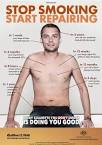What
Happens When You Quit Smoking
What happens
when you quit smoking? Your life gets better. A lot better.
Here are some
details.
The nicotine
from just one cigarette can cause the blood vessels to constrict for up to six
hours.
This effect goes away quickly when you stop. As your blood vessels
relax, your blood pressure decreases and strain is taken off your
heart.
Within eight
hours the carbon monoxide starts to clear from your blood stream and
the oxygen levels in your blood begin to rise. BTW – measuring carbon dioxide
levels lets insurance companies know if people who claim to be smoke-free
really are.
Over two days
you sense of smell and taste improve. You’ll enjoy your food more
than you have in years.
Over several
weeks, the risk of both heart disease and lung disease start to decrease.
The longer you go without cigarettes, the lower the risk becomes.
Go one year
without smoking and you cut your risk of heart disease in half. Stay smoke
free for 10-15 years and your risk of heart disease will be the same as if you
never have smoked.
Your risk of
cancer and stroke also decrease dramatically as time goes by.
Unfortunately,
if you’ve already developed emphysema the damage can’t be completely reversed.
However, stopping smoking will prevent progression and will improve lung
function.
In the shorter
term (three to twelve months) chronic cough and phlegm production will
decrease. Shortness of breath will decrease and exercise tolerance will
increase.
You can also
expect to have more money in your pocket beginning immediately. I
suggest you save the money you’re no longer spending on cigarettes and use at
least some of it to reward yourself for giving up smoking.
So that's some
of what happens when you quit smoking. Here's a program to help you stop
smoking and start noticing these changes:


No comments:
Post a Comment